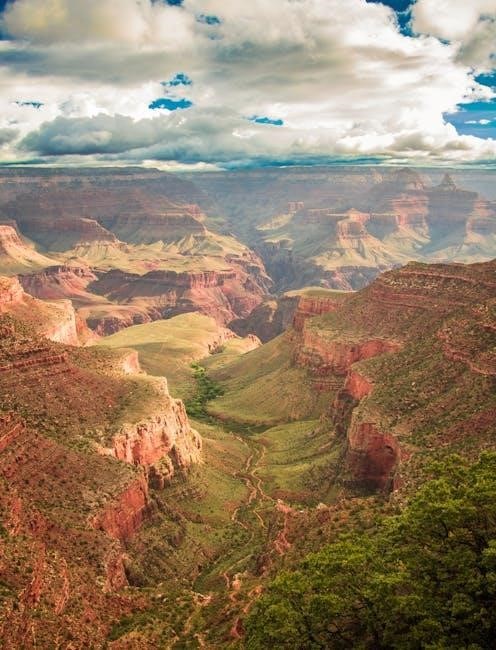
An Arizona Last Will and Testament is a legal document outlining how an individual’s assets, property, and wishes will be managed and distributed after their death.
Definition and Purpose
An Arizona Last Will and Testament is a legal document that outlines how an individual’s assets, property, and personal belongings will be distributed after their death. Its primary purpose is to ensure that the testator’s wishes are respected and carried out. The document allows individuals to designate beneficiaries, appoint an executor, and specify funeral instructions. It also covers the distribution of both real and personal property, ensuring clarity and avoiding disputes among heirs. This document is essential for estate planning in Arizona.
Importance of Having a Will in Arizona
Having a Last Will and Testament in Arizona ensures your assets are distributed according to your wishes, avoiding state intestacy laws. It allows you to appoint an executor, name guardians for minors, and specify funeral instructions. A will prevents disputes among heirs and ensures property, both real and personal, is allocated as intended. Without a will, the court decides, which may not align with your preferences, potentially causing family conflicts and unnecessary legal complications.
Legal Requirements for a Valid Will in Arizona
A valid Arizona will must be in writing, signed by the testator, and witnessed by two individuals. It must comply with state laws to ensure legality.
Testator’s Capacity and Signature
The testator must have legal capacity, meaning they must be at least 18 years old and of sound mind. The will must be signed in the presence of two witnesses, who can then attest to the testator’s mental capacity. This ensures the document’s validity under Arizona law, preventing disputes over its authenticity. Proper execution is crucial to uphold the testator’s wishes and avoid legal challenges.
Witnesses and Notarization
Arizona requires two witnesses to sign the will in the testator’s presence; They must attest that the testator appeared mentally competent and acted voluntarily. While notarization isn’t mandatory, it can expedite probate by creating a “self-proving” will. This step ensures authenticity and simplifies the legal process, reducing potential disputes. Witnesses should be impartial and not beneficiaries to avoid conflicts of interest, ensuring the will’s validity and enforceability under state law.

Structure of an Arizona Last Will and Testament
The document typically includes the testator’s declaration, appointment of an executor, instructions for asset distribution, and provisions for special bequests, ending with signatures and witness acknowledgments.
Key Sections of the Document
The Arizona Last Will and Testament includes sections for the testator’s personal information, appointment of an executor, designation of beneficiaries, distribution of assets, special bequests, payment of debts, and funeral instructions. It also outlines the executor’s powers and includes witness signatures for validation. These sections ensure clarity and legality, covering all aspects of estate management and distribution according to the testator’s wishes.
Special Bequests and Residual Estate
A Arizona Last Will and Testament allows for specific gifts, known as special bequests, to be left to designated individuals or organizations. The residual estate refers to the remaining assets after debts, expenses, and special bequests are fulfilled. This section ensures that all property is distributed according to the testator’s wishes, providing clarity and avoiding disputes. Properly outlining these sections is essential for a comprehensive and legally sound estate plan.

Creating Your Arizona Last Will and Testament
Creating your Arizona Last Will and Testament involves drafting a legal document outlining asset distribution, using a PDF template for clarity and personalization, ensuring it meets Arizona’s legal requirements.
Step-by-Step Guide to Drafting the Will
Start by identifying the testator and stating their intent to create the will. Appoint an executor to manage the estate. List all assets, including real and personal property. Designate beneficiaries for specific gifts or bequests. Address the distribution of the residual estate. Include instructions for paying debts and funeral expenses. Add any special requests or conditions. Ensure the document is signed, witnessed, and notarized according to Arizona state laws to validate the will and ensure its enforceability.
Choosing the Right Template
Select a template that complies with Arizona state laws and suits your specific needs. Opt for a professional, customizable PDF template that covers asset distribution, executor appointment, and other key elements. Ensure it includes sections for special bequests, residual estate, and funeral instructions. Choose a template that is easy to download, printable, and editable in Word or another format. Verify that it is legally binding and validated by legal experts to ensure compliance with Arizona’s legal requirements for a valid will.

Executing the Will Legally
Sign the will in the presence of two witnesses and a notary to ensure legality. Witnesses must confirm your capacity and voluntary signature, adhering to Arizona state laws.
Signing and Witnessing the Document
The will must be signed by the testator in the presence of two witnesses, who must also sign the document. Witnesses should be disinterested parties with no direct benefit from the will. The signing process ensures the testator’s capacity and voluntary consent, adhering to Arizona’s legal standards. Proper witnessing is crucial for the will’s validity, preventing potential disputes during probate. The notary’s role adds an extra layer of authentication, confirming the testator’s identity and the document’s legitimacy.
Notarization and Filing
Notarization enhances the will’s authenticity, though Arizona doesn’t mandate it. The notary verifies the testator’s identity and willingness, reducing fraud risks. After execution, the will should be filed with the probate court upon the testator’s death. The original document must be securely stored, often in a fireproof safe or with an attorney. Proper filing ensures the will is recognized during probate, facilitating the estate’s distribution according to the testator’s wishes. This step is vital for legal validation and smooth estate administration.

Common Mistakes to Avoid
Common errors include improper witnessing, unsigned documents, and outdated information. Failing to update the will after life changes can lead to legal disputes and invalidation of wishes.
Errors That Can Invalidate the Will
Common errors that can invalidate a will include improper witnessing, lack of testator signature, outdated information, and failure to meet Arizona’s legal requirements. Missing or forged signatures, along with unclear or ambiguous language, can lead to disputes. Additionally, notarization mistakes or failure to update the will after significant life changes, such as divorce or birth of a child, can render the document invalid. Ensuring the will is properly drafted and executed is crucial to avoid legal challenges and ensure wishes are honored.
Updating the Will
Regularly updating your Arizona Last Will and Testament is essential to reflect life changes, such as marriage, divorce, birth of a child, or acquisition of new assets. Reviewing the will every 5-10 years or after significant events ensures it remains relevant and accurate. Revisions can be made by creating a new will or adding a codicil. Proper execution, including witness signatures and notarization, is required to maintain the document’s legality and enforceability. Keeping the will updated guarantees your wishes are respected and avoids potential legal disputes.

DIY Templates for Arizona Last Will and Testament
Arizona Last Will and Testament PDF templates are widely available online, offering a cost-effective and accessible way to create a legally binding document from home.
Where to Find Reliable PDF Templates
Reputable sources like legal websites, estate planning platforms, and official state resources offer free Arizona Last Will and Testament PDF templates. These documents are professionally created, ensuring compliance with Arizona laws. Many platforms provide templates in multiple formats, such as PDF and Word, for easy customization. Users can download, print, and fill out the forms at home, making the process convenient and accessible. Ensure the template is specific to Arizona to guarantee legal validity and coverage of state-specific requirements.
Pros and Cons of Using DIY Templates
Using DIY templates for an Arizona Last Will and Testament offers cost savings and convenience, allowing individuals to create a will independently. However, DIY templates may lack personalized legal advice, potentially leading to oversights or errors. While they are suitable for straightforward estates, complex situations may require professional guidance to ensure all wishes are properly documented and legally binding. Balancing affordability with potential risks is key when deciding to use DIY templates.

Role of an Executor in Arizona
The executor manages the estate, pays debts, and distributes assets according to the will, acting as the legal representative ensuring the testator’s wishes are fulfilled.
Responsibilities and Powers
The executor is responsible for managing the estate, paying debts, and distributing assets as per the will. They have the legal authority to sell property, settle claims, and ensure the testator’s wishes are carried out. The executor must act in the best interest of the estate and beneficiaries, maintaining accurate records and providing updates when required. Their powers include handling financial transactions, resolving disputes, and overseeing the orderly administration of the estate until all obligations are fulfilled.
Choosing the Right Executor
Selecting a trustworthy and capable executor is crucial. They should be organized, financially literate, and able to manage conflicts fairly. Ideally, choose someone familiar with the estate or beneficiaries. A family member, close friend, or professional trustee can be appointed. Ensure the executor is willing and able to fulfill the role, as it involves significant responsibilities. Naming an alternate executor is also wise in case the primary choice is unable to serve. Their decision-making skills and integrity are vital for carrying out the testator’s wishes effectively and efficiently.
Funeral and Burial Instructions
The Will allows you to specify funeral preferences and burial arrangements, ensuring your wishes are honored. It also directs how related expenses and debts are settled.
Including Funeral Wishes in the Will
In an Arizona Last Will and Testament, individuals can outline their funeral and burial preferences, ensuring their wishes are honored. This section allows the testator to specify funeral arrangements, burial instructions, and how related expenses should be paid. It also directs the executor to prioritize settling debts and final expenses, ensuring a smooth process without disrupting the distribution of the estate. This provision provides clarity and peace of mind for loved ones.
Paying Debts and Expenses
An Arizona Last Will and Testament often includes provisions for paying debts, expenses of the last illness, funeral, and burial. The testator directs that these obligations be settled promptly after their death. This ensures that the estate is distributed smoothly, without unresolved liabilities. Executors are tasked with managing these payments, ensuring compliance with the testator’s wishes and Arizona law. This section provides clarity and peace of mind, knowing that final expenses are addressed appropriately.
Creating an Arizona Last Will and Testament ensures your wishes are honored, providing peace of mind. Use a free PDF template to safeguard your legacy and loved ones.
Final Thoughts on Preparing Your Will
Preparing an Arizona Last Will and Testament is a crucial step in ensuring your wishes are respected. Using a free PDF template simplifies the process, allowing you to outline asset distribution, name an executor, and specify funeral instructions. It’s essential to address debts and expenses to ease the burden on loved ones. Regular updates ensure the document remains relevant, reflecting life changes and legal requirements. Taking these steps provides clarity and peace of mind for you and your family.